Advertisement
Future Of Work
What The Data Tell Us About The Future Of Work In Mass.
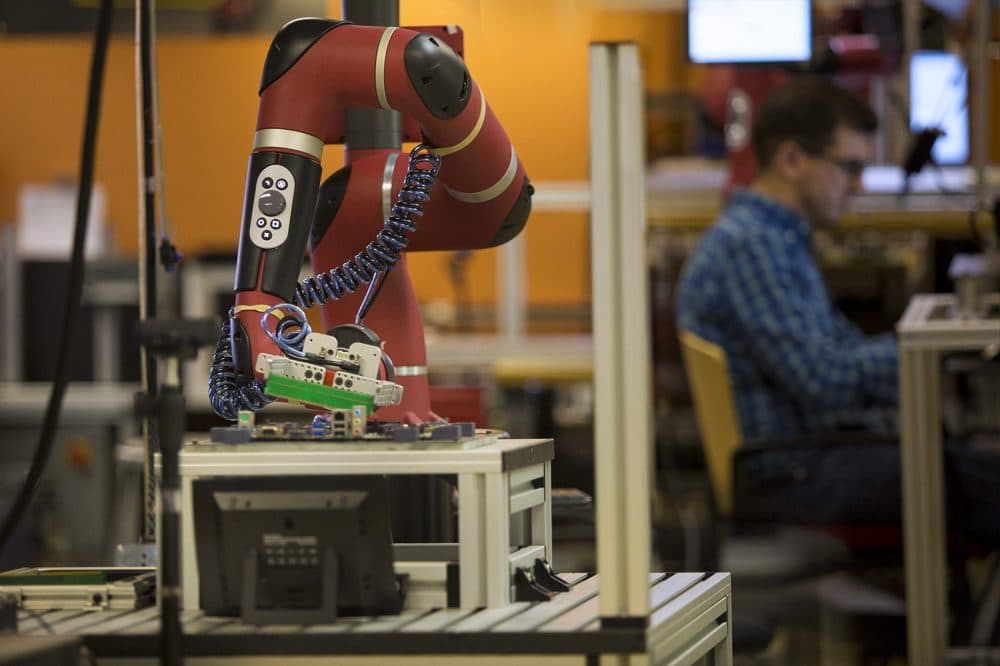
The jobs we do and the way we work are changing. Some jobs today were unthinkable just a decade ago, while jobs that used to power the Massachusetts economy have completely disappeared.
Automation and artificial intelligence are expected to further revolutionize how we work. And that could have serious implications for how our society functions. We wanted to understand what's going on.
So, WBUR's biz and tech team -- BostonomiX -- sought to answer two big questions:
1. What are the jobs of the future?
2. What skills will people need for those jobs?
We started by digging through data from the Massachusetts Office of Labor and Workforce Development. Below is a snapshot of what we discovered:
Health Care And Computers — The Jobs Of The Future
There are a couple of key sectors that are expected to dominate job growth in the coming years: health care and computers.
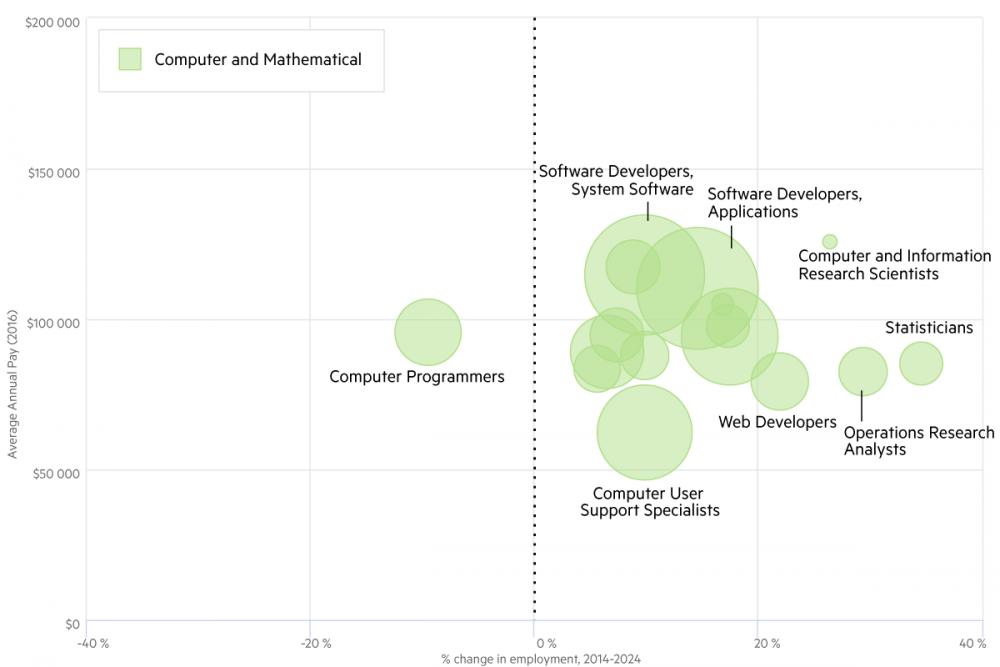
Nearly every computer or math-related job — such as statisticians and web developers — is expected to grow in numbers. The only decline expected in this industry is for computer programmers (by 9.5 percent).
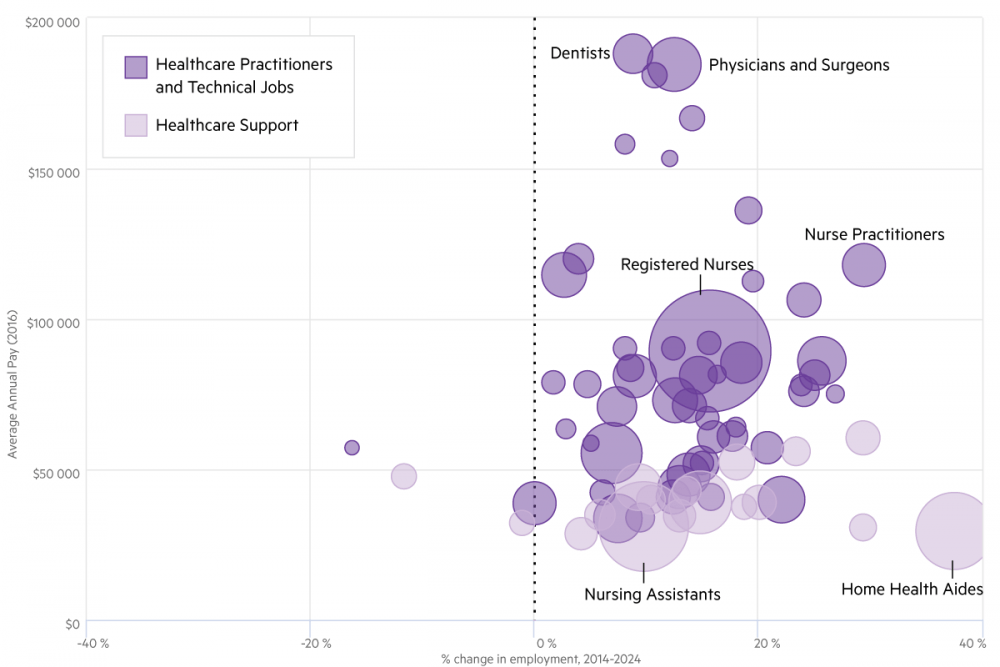
Health care is a sweeping sector that includes everyone from surgeons to home health aides. And the growth is wide-ranging. Almost every occupation in the sector is predicted to add jobs, regardless of its educational qualification or pay.
Within health care there's essentially a three-tiered hierarchy:
1. Highly skilled jobs like dentists, doctors and nurse practitioners. These jobs require advanced degrees and also traditionally yield lucrative salaries.
The average yearly income for a dentist in Massachusetts, for example, was $188,020 in 2016. These jobs are growing but there's not as much demand for them as, say, a registered nurse (which falls into our next category).
2. Jobs that require a bachelor's degree or associate's degree — such as a registered nurse, a technician or an audiologist
Salaries for all of these jobs tend to be significantly lower than the first group. For example, registered nurses made $89,060 on average in 2016. And dietitians and nutritionists made $60,620 on average in 2016.
3. Jobs that require no bachelor's degree, such as a nursing assistant. And jobs that require no formal education credential, such as a home health aide.
The average salary for a nursing assistant is less than half the salary of a traditional health care job that requires a bachelor's degree. Nursing assistants, for example, made, on average, $30,960 in 2016.
Static Jobs In A Changing Economy
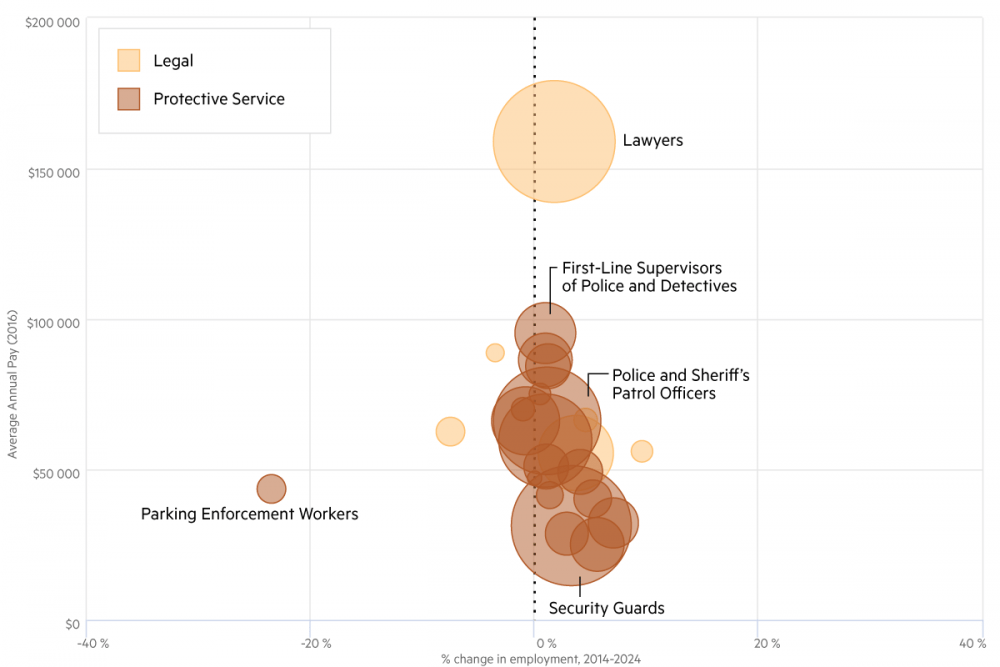
There are some sectors that are expected to remain relatively stagnant over the next decade. This includes office/administrative support, protective services and legal work.
With the exception of lawyers, most of these jobs pay well under $100,000.
Lawyers make one of the highest average salaries for any profession — $158,760. And there's a lot of them in the workforce — some 22,000. But, according to state forecasts, lawyers will see minuscule job growth over a decade through 2024 (1.8 percent).
In fact, law school admissions nationally have dropped by some 40 percent in recent years, according to ABA data.
Try It Yourself. Is My Job Safe?
If you're curious about your own job (or the career change you think you ought to make after reading our series!), you can play around with this tool we created -- and explore every major occupation group in the state. We did and found that reporter jobs are projected to decline by 10.6 percent. :(
The Y axis is the average current salary. The X axis is the expected job growth (or decline) from 2014 to 2024, according to the state data.
When you click on a sector, all of the jobs within that classification pop up. The size of the bubble indicates how many people are employed in a particular occupation. So, for example, medical transcriptionists is tiny compared with nursing assistants.
If you hover over the chart, you can see the average salary for a profession, the type of education traditionally needed for the job, and other helpful details.
(Note: To best dive into the data, we recommend viewing this on a desktop.)
The Big Job Winners
Home health aide is the fastest growing job in Massachusetts — nearly off our chart. By 2024, over 30,000 people in the state are expected to be working in this profession -- a 37.5 percent growth in the span of decade. But there's a huge disconnect between the demand for home health aides and the poor pay. It's a largely female and heavily immigrant workforce with scarcely any labor protections and guidelines.
Personal care aides are also expected to see substantial growth. But, like home health aides, neither profession requires a formal educational credential and neither pays well. The average salary for a personal care aide in Massachusetts in 2016 was $28,260. And the average salary for a home health aide wasn't much better: $29,200. In other words, service jobs like this are among the fastest growing, but least paying jobs of the future.
There are, however, other popular professions that are adding jobs robustly and pay substantially more money — including nurse practitioners ($117,860), statisticians ($85,120), and interpreters/translators ($58,960).
The Jobs That Will Disappear
Experts often point out that repetitive work is more easily automated, and those workers are more likely to be displaced. It seems we're already seeing signs of that shifting economy.
Accounting clerks and administrative assistants are expected to see the biggest decline in raw numbers. Tellers, dishwashers, fast food cooks and mail carriers are not far behind.
When you look at the estimated decline by percentage, you'll see a snapshot of a workforce from a seemingly bygone era — telephone operators, photo developers, parking enforcement workers, tool grinders, computer operators and motion picture projectionists.
Most of the jobs in steepest decline are in the production industry, which includes many factory and manufacturing jobs. Technology has radically changed these professions. But, technology has also helped the manufacturing industry play an outsized role in economic output. And manufacturing is becoming more advanced and will required more highly skilled workers.
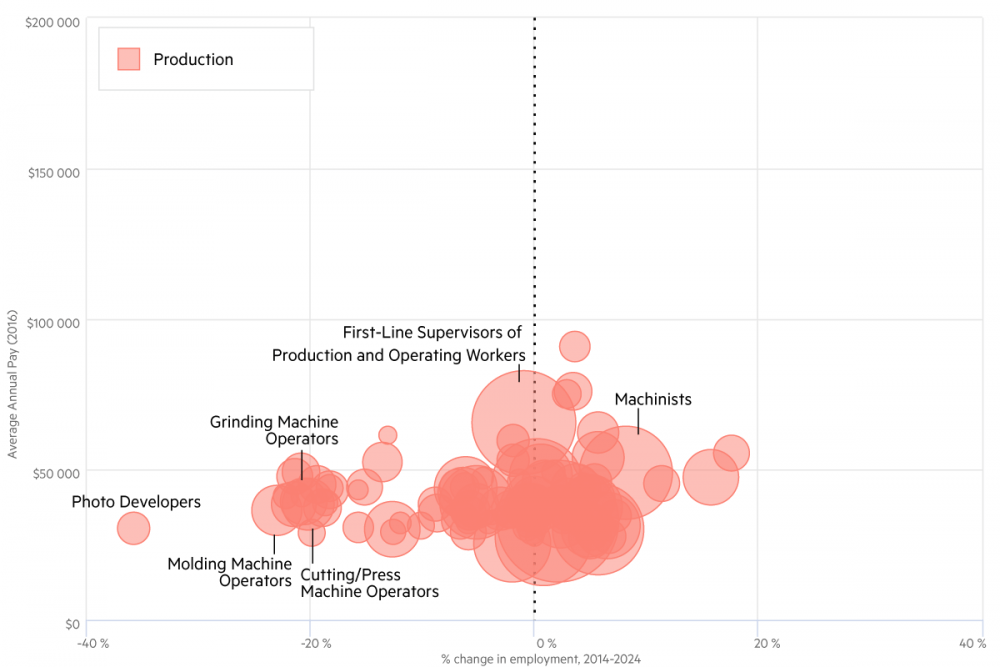
But even among some more skilled professions, the future looks bleak. For example, declines are projected for tax preparers (by 4.2 percent) and insurance underwriters (by 11.7 percent).
Overall, the job projections also paint an interesting picture of the skills that our workforce needs moving forward. There's a mismatch between the skills that our workforce has and the jobs that are out there — and rapidly growing. This disparity — or skills gap — is something to watch as technology continues to transform all industries.
How We Got This Data
Our data comes from the state, which reflects numbers from the Bureau of Labor Statistics. The Massachusetts Office of Labor and Workforce Development collects data to make long-term job projections. The most recent projections are for 2014 to 2024. Occupations are defined by the Standard Occupational Classification (SOC). So, for example, if you want to know exactly what a "computer and information research scientist" is, you can find it by selecting "computer and mathematical occupations" on that page. (The answer is here, by the way.)


